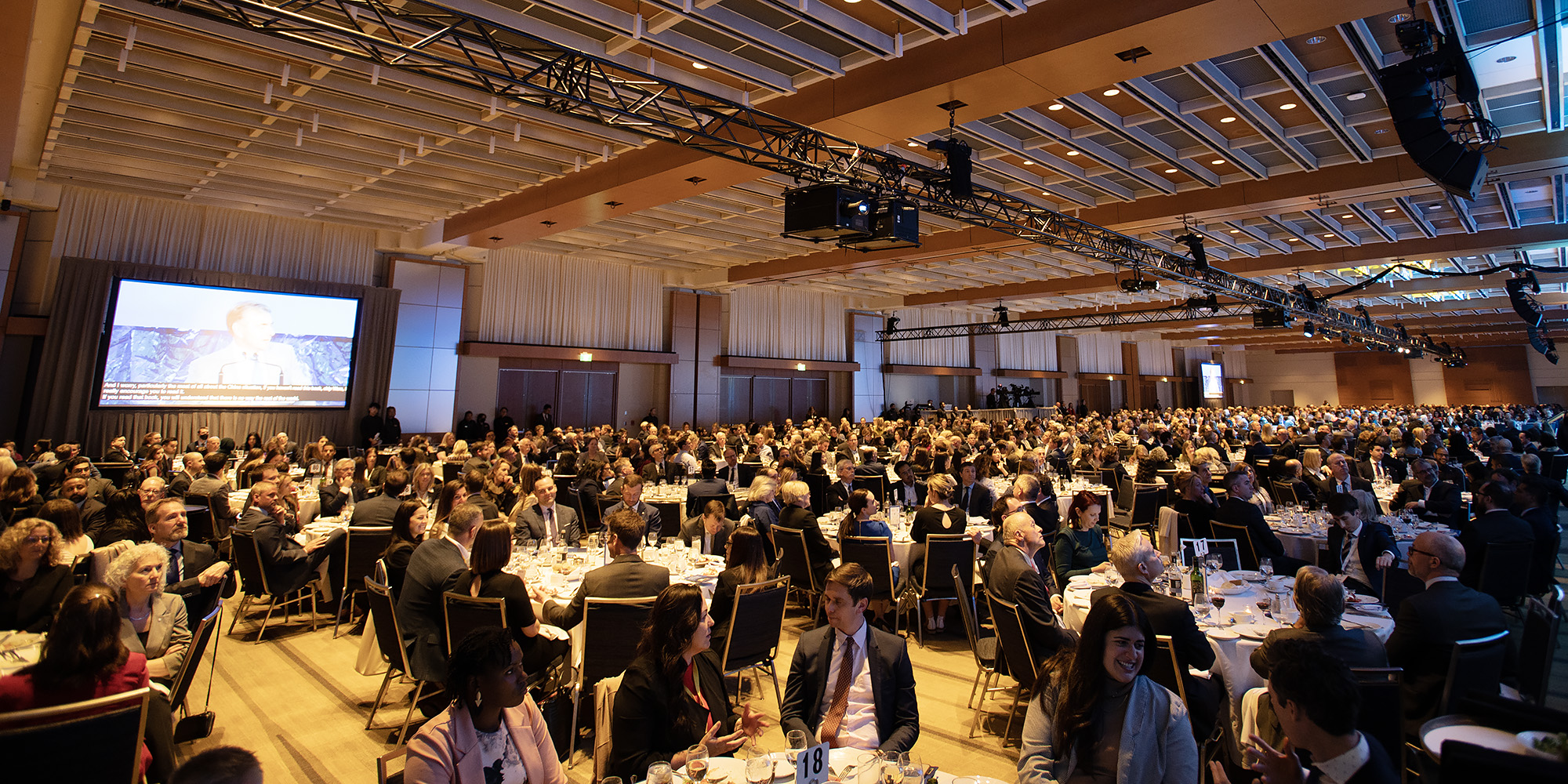
ICYMI: Growth Summit and Testimonial Dinner Blog
9:21 p.m.
That’s a wrap – see you at Wonk Prom!
8:49 p.m.
.@LaurentDTardif – NFL football player, a graduate of medicine and an exemplar of community spirit – wins Testimonial Award.
Profile here: https://t.co/L6DnxZya9R #PPFAwards pic.twitter.com/TMRcnLVo6T
— Public Policy Forum (@ppforumca) April 28, 2023
8:48 p.m.
Harold Calla: “There is capacity in First Nations communities to deal with the issues before us.”
8:30 p.m.
Harold Calla, Executive Chair of @FNFMB, wins Testimonial Award.
Profile here. https://t.co/BNzLqtgFCN#PPFAwards pic.twitter.com/k8ToXWOZAk
— Public Policy Forum (@ppforumca) April 28, 2023
8:20 p.m.
.@cibc Vice-Chair of Global Investment Banking, @lraitt wins Testimonial Award.
Profile here: https://t.co/DtAvbuMaOn#PPFAwards pic.twitter.com/jvSKZJYs8s
— Public Policy Forum (@ppforumca) April 28, 2023
8:15 p.m.
Janice Stein: “Great public policy is a team sport, everybody has to play and Canada needs to play as one team. Of course we need political leaders and the very best of our civil service, some of whom are in this room with us tonight.”
“But we also need the developers of the AI and designers of the robots who are changing our world and understand what it means. We need scientists at the table, we need private sector leaders who live, eat, breathe and sleep execution, every day.”
.@SteinJanice, founding director of @munkschool and one of Canada’s most important public intellectuals, wins Testimonial Award.
Profile here. https://t.co/xY2HTTgA2W #PPFAwards pic.twitter.com/NHAvOc97OH
— Public Policy Forum (@ppforumca) April 28, 2023
7:49 p.m.
So the room is, um, pretty packed #PPFAwards pic.twitter.com/CTyjbmaP6N
— Public Policy Forum (@ppforumca) April 27, 2023
7:40 p.m.
Winners so far tonight at #PPFAwards: John Risley @snolen @MolooNailahttps://t.co/sWI2LeL9fC pic.twitter.com/k4DOfmrqf6
— Public Policy Forum (@ppforumca) April 27, 2023
7:22 p.m.
John Risley, former Clearwater Seafoods CEO and a leader in reconciliation in Canadian business, made emphatic remarks on fixing broken systems.
John Risley: “I’m more worried now than I ever have been, and I say that because I think we’ve got some huge problems in this country, and globally.”
“At home they start with our health-care system. We like to talk about it internationally as a system of which we’re proud – we’re not proud of our system, our system is badly broken and we don’t know what to do to fix it.
“We need to stop thinking about fixing the system by pouring more money into it, you don’t fix a broken company by pouring more money into it, you rethink strategy and direction.”
7:09 p.m.
John Risley, former @Clearwatersea CEO and a leader in reconciliation in Canadian business, wins Testimonial Dinner Award.
Profile here: https://t.co/E9xyeCS6Cl #PPFAwards pic.twitter.com/v9LcfUtsx9
— Public Policy Forum (@ppforumca) April 27, 2023
6:52 p.m.
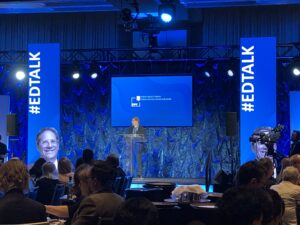
“Canada does best when it initiates, not reacts. This could be our guiding light. Now we need to get in front of the parade,” PPF’s President and CEO Ed Greenspon told a packed Testimonial Dinner crowd.
6:24 p.m.
And the great @yolandejames is in the house as emcee for #PPFAwards
— Public Policy Forum (@ppforumca) April 27, 2023
.@HoCSpeaker @AnthonyRota is onstage trying to quiet more than 1,100 chatty policymakers: “Order! It usually works in the house! If you can hear my voice please say Shhh!” And again: “We’re on CPAC tonight so I want everyone to be on their best behaviour." #PPFAwards
— Public Policy Forum (@ppforumca) April 27, 2023
And the 35th annual Testimonial Dinner and Honour Roll has begun! Chills from Sole Power’s national anthem #PPFAwards pic.twitter.com/t9Nrhed9Er
— Public Policy Forum (@ppforumca) April 27, 2023
4:31 p.m.
Taking a pause after Growth Summit – we will return for tonight’s Testimonial Dinner Honour Roll.
4:25
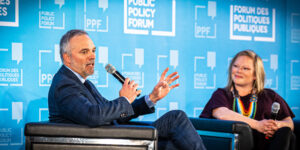
Last year, 23 First Nation and Métis communities acquired an almost 12 percent interest in Enbridge-operated pipelines in northern Alberta for $1.12 billion.
It was the largest energy-related Indigenous economic partnership Canada had seen. At Canada Growth Summit just now, Desiree Norwegian asked Colin Gruending, Enbridge Executive Vice President and President, Liquids Pipelines about advice for others embarking on similar deals.
“You can only go at the speed of trust – I’ve heard that, I didn’t create that, but I love it, it makes so much sense” Gruending said. “ Be uncorporate. Humility. Listening.”
Agreed Norwegian: “It’s providing that opportunity to people, pulling up a chair for someone to say hey, let’s sit down and chat. That right there shows what type of person, what type of company you are,” she said. “It’s really holding that space, even at your board of directors’ tables.”
“We got to alignment relatively quickly knowing the first principles, this was going to be inclusive, multigenerational, our communities are going to have a bigger voice.
We had our first annual general meeting, it was a pretty rich experience, I’d say.
“You can only go at the speed of trust – I’ve heard that, I didn’t create that, but I love it, it makes so much sense. Be uncorporate. Humility. Listening.”
3:45 p.m.

On integration, Rupa Banerjee, Canada Research Chair in Economic Inclusion, Employment and Entrepreneurship of Canada’s Immigrants, asked at Canada Growth Summit: “Is this move toward two-step migration really the perfect panacea to fix this major issue of immigrants facing barriers in the labour market, and I would say no. I think there is a huge gap in terms of integration policies that really really need to be looked at.”
“We’ve moved the burden of responsibility for becoming acculturated to the newcomer completely. So you come as an international student or a foreign worker with no supports, no access to settlement services and now you’re expected to get that social capital and language skills and all of those kinds of experiences that employers want, before you apply for permanent resident status. That’s a real shift in our model of migration, which really was a nation-building approach.”
3:39 p.m.

Brett House, Professor of Professional Practice, Columbia School of Business, moderates a panel with Rupa Banerjee, Canada Research Chair in Economic Inclusion, Employment and Entrepreneurship of Canada’s Immigrants and Christiane Fox, Deputy Minister, Immigration, Refugees and Citizenship Canada at Canada Growth Summit.Christiane Fox, Deputy Minister, Immigration, Refugees and Citizenship Canada, highlights Canada’s immigration numbers.
“We have a big ambitious commitment when it comes to permanent residents, by 2025 the country will have welcomed 500,000 new permanent residents, and that is the largest number that we have seen.”
“We have a temporary resident program that is uncapped that is seeing volumes like we’ve never seen them before. Just last year alone, 600,000 work permits, 800,000 study permits.”
“Last year at this time we were at 180,000 applications in the system for students, and already in April we are at 240,000.”
“Migration is driving 100 percent of our population growth. One in four people in 2021 were immigrants, that is the highest in the G7.”
“Immigration is actually the country’s biggest economic program.”
3:03

In response to a question from Kathleen Gnocato, Vice President, Strategic Engagement, Public Policy Forum, about whether we are ready for the next pandemic, Simon Kennedy, Deputy Minister, Innovation, Science and Economic Development Canada, says the federal government is making systematic efforts to look at areas where we are weak.
“Fill and finish is an important part of the vaccine process, you can make the bulk substance in a big vat, I guess, and it’s got to be put in these little vials. That’s a specialized process, and there are companies that do nothing but that, and we have invested in several to dramatically scale up.”
“We’re doing that at all the key chokepoints, so I actually think we’re in a much better place than we were a few years ago.”
“The challenge for governments, and the challenge for policymakers, and that a lot of people are thinking about is: how do you keep the edge of the blade sharp in peacetime when you don’t have a crisis breathing down your neck? A lot of this capacity may or may not be fully economic to have in a country like Canada, you may or may need the kind of firepower you need in an emergency.”
2:35

Seamus O’Regan Jr., Minister of Labour, on the terminology of the energy transition: “Words matter, tone matters.”
“‘Just transition’ is toxic, and it is toxic to the very constituency that we need to get things done. Workers hate it, it gives them anxiety.”
“‘Just transition’ is a “highfalutin term and it’s toxic,” O’Regan Jr. said, who suggests moving on from the expression “because the only people who matter on the energy transition are workers.”
2:31 p.m.
Minister of Labour @SeamusORegan Jr. sits down for a fireside chat with PPF’s Director of Policy and Content Programming @katieefeenan to discuss the future of Canada’s industrial policy. https://t.co/sWI2LeKBq4#CanadaGrowthSummit pic.twitter.com/RIwF6Tox36
— Public Policy Forum (@ppforumca) April 27, 2023
2:07 p.m.

Zi-Ann Lum, Reporter, POLITICO, speaks with Ian McKay, Ambassador of Canada to Japan, and Nadia Theodore, Ambassador and Permanent Representative of Canada to the World Trade Organization about the splintering on international trade at Canada Growth Summit.
Nadia Theodore on the role of trade intensification: “Trade is indeed expected to increase, that is a fact. And I think it’s really more about figuring out how the changing nature of trade becomes an opportunity for Canada, and for our businesses.”
Ian McKay: “The world, in spite of its geopolitical tensions and recent supply chain disruptions – economies are going, particularly in the region of the world that I’m most involved in. The middle class is growing, economies are growing, trade will intensify and the complications of geopolitical tensions will undoubtedly have a significant impact on that.”
1:40 p.m.
.@TaylorVaisey: “Why does it seem like everyone in my life was caught off guard by the rise of chat bots, whether it’s ChatGPT or Bing or others that are emerging?”
Chris Barry, President, @microsoftcanada:
“The ability for people in all walks of life to immediately ideate on… pic.twitter.com/KRm3sP6kBn
— Public Policy Forum (@ppforumca) April 27, 2023
1:36 p.m.

Nick Taylor-Vaisey moderates a fireside chat with Chris Barry, President, Microsoft Canada and Owen Larter, Director of Public Policy, Office of Responsible AI, Microsoft, April 27, in Toronto.
12:40 p.m.
“Canada’s higher education system is one of our greatest assets,” Dr. Rhonda Lenton, President, York University, told Canada Growth Summit.
“By leaning into our universities and colleges, Canada will absolutely be able to enhance its reputation for driving a multinational approach to tackling the global challenge we face.”
12:13 p.m.
John Risley, Chairman and CEO, CFFI Ventures, on the promise of hydrogen:
“Hydrogen is already a huge industry around the world, you can’t make steel, you can’t refine oil, you can’t make fertilizer without it. And the production of hydrogen today is very carbon-intensive, it accounts for more than two percent of global emissions.”
“If we can convert the production of hydrogen today, just in existing use cases, to green, that has a big impact on the global carbon emission blueprint.”
12:01 p.m.

Michael Serapio moderates the Fireside Chat: Why Hydrogen Is The Number One Element On The Periodic Table, with Mollie Johnson, Dr. Stefan Kaufmann and John Risley.
Stefan Kaufmann on hydrogen in Europe: “Hydrogen is really a game changer to reach our climate goals.” “For Europe, we can transport green energy … by shipping it as a fuel, as ammonia or liquid hydrogen, in the future.” “Europe is a global leader in green technologies, hydrogen technologies, but we see that we need global action and global cooperation to reach our global climate goals. That’s why the European Union is very committed to strengthening cooperation in the hydrogen sector with Canada.”
11:57 a.m.
Mollie Johnson, Associate Deputy Minister @NRCan, at #canadagrowthsummit on the promise of hydrogen:
“We talk a lot about electrification and the different pathways for decarbonization, but we can’t electrify everything, and so we really need to be thinking about the mix of…
— Public Policy Forum (@ppforumca) April 27, 2023
11:25 a.m.

In conversation with Steve Verheul for a Fireside Chat: A New Trade System In An Age Of Geopolitical Change:
Sean_Speer asks, “Are we moving towards a world of regional trade arrangements, or what are sometimes described as values-based arrangements? Are we going through a process of effectively Balkanizing the world trade system, and what are the consequences?”
Steve Verheul says:
“I think frankly we are heading that way. Whether or not trade has much to do with the creation of some of the challenges we’re facing now, it is certainly getting a disproportionate share of the blame for some of those changes. As rising tensions happen in geopolitics, as climate change comes along, in particular the growing conflict between the U.S. and China, we are starting to see increasingly that markets are heading towards segmentation.”
“I think we’re heading in a direction where we are going to have values-based alliances.”
11:10 a.m.
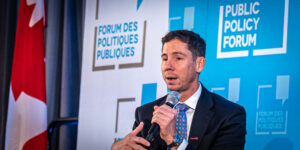
In response to a question from Ed Greenspon, President & CEO, Public Policy Forum about how Rio Tinto fits into Canada’s industrial strategy, Ivan Vella, Chief Executive, Aluminium, Rio Tinto says:
“We clearly see a lot of opportunity in the energy transition, and we really want to gear our business around supporting that. That means decarbonizing our business, I think that’s very in line with Canada’s strategy around green, zero-carbon industry. With that though has to come competitiveness, long-term high-paying jobs, things that people can be confident in. And so we really have to think hard as we decarbonize, as we change and as we grow our business, making sure it really is sustainable economically.”
10:35 a.m.
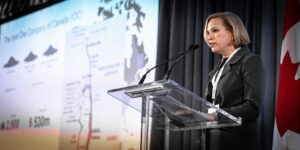
Alice Tharenos, CFO of Iron Ore Canada, during her Lightning Talk: The Strength Of Green Steel at the Canada Growth Summit, April 27 in Toronto.
Alice Tharenos, CFO of Iron Ore Canada, on the superpower of Green Steel:
“To reach net zero, the world needs a lot more steel to drive and power the energy transition. Steel is a critical material for technologies such as wind turbines, electric vehicles, light rail trains and advanced manufacturing processes.”
“It is estimated the world will need 2.8 billion tonnes of steel by 2050 to build the new infrastructure and equipment needed to fuel the energy transition.”
10:27 a.m.
Roman Dubczak, Deputy Chair, Capital Markets, CIBC Capital Markets on the government’s most recent budget:
“There are alot of projects that are still on the drawing boards, or in the minds of our clients, and the economics will dictate whether they’ll go ahead with that or not, so having those numbers up front will dictate where they go.”
10:23 a.m.

Lisa Raitt, Vice-Chair and Managing Director, Global Investment Banking at CIBC, on the federal government’s most recent budget: “What I liked is the recognition that there has to be a response to the competitive nature of the IRA, so from a business perspective at least they’re getting it. And it was a large part of the budget too, a significant portion of the budget.”
But: “Clients are ready, either in oil and gas, in power, or in industry, to get going on abating their carbon. It means it has to have negotiations at the table to see what it all looks like because we don’t have absolute clarity, the numbers haven’t settled so that folks at CIBC can crunch them for clients.”
9:55 a.m.
Here’s Michael McNair, Global Managing Director, Tony Blair Institute for Global Change, on the gargantuan shift in geopolitics:
“Overwhelmingly right now the demand on getting big things done is building the digital infrastructure to enable high-quality services for citizens, growing economic prosperity.”
“Countries … are having to make really difficult choices of: Do I buy a data centre from Huawei, or do I buy it from Oracle, and what will that mean in five or ten years based on the decision that I make? And Canada has an opportunity as a friendly, middle-power, to be part of those conversations, and to bring our own national interest to those conversations.”
9:47 a.m.
Robert Johnston, of Columbia’s Center on Global Energy Policy, told Canada Growth Summit:
“For both the U.S. and China, industrial policy is very linked to national security. And what I see happening in Canada is we are doing industrial policy, but I’m not sure we’ve found the motivation behind it yet, the nationally-defined purpose.”
Thursday, 9:36 a.m.

Janice Stein, Belzberg Professor of Conflict Management at UofT, on how the geopolitics landscape is changing:
“Innovation is occurring in the civilian sector, and the military is trying to figure out how you procure from the civilian sector. What does that mean? Almost everything that is going to push growth forward in our economies is also a national security issue.”
“There is now an intermesh of national security and prosperity and economic growth and we are not going to be able to separate that conversation anymore.”
Thursday, 8:20 a.m.
Sharleen Gale, Chair of the First Nations Major Projects Coalition, on what economic reconciliation looks like in her community of Fort Nelson, B.C.
“I live in the trenches, I live in the community, I live on the ground and I see the impacts of colonization, I see what it has done to our people over the last 100 years. But I also see the need for economic reconciliation.”
“We as the people are not going anywhere, we’re going to continue living in our communities, we’re going to continue coming up with solutions, to be a part of our economies, to work together.”
“Going forward, all projects are going to cross Indigenous land, which is in Canada, and we need to be a part of that. We don’t want to be sitting in the courts anymore, but we do want to move forward together and honour – some of our nations across Canada have treaties and those treaties weren’t cede and surrender, they were peace and sharing treaties, and we continue to look at that as we go forward, and take guidance from our youth and our elders.
“I look forward to the future. I can honestly say I look forward to the future.”
Thursday, 8:05 a.m.
Clint Davis, CEO of North35, on how NORAD’s next steps can play a large role in economic reconciliation: “We can’t have growth in this country unless it’s safe and secure.”
“NORAD modernization could potentially be that economic reconciliation. Why? Because the Inuit are the eyes and years of the Canadian military in the North. We have to be involved.”
“Our communities up north, they do not experience an infrastructure reality that exists in a place where we would take it for granted in the south.”
“What we view as not only a generational opportunity for NORAD modernization, which would and must require Inuit involvement, we think that additional investments that will happen as a result of NORAD modernization can serve as multi-purpose infrastructure for the benefit of communities – think about broadband, think about clean water, think about air strips.”
“That is a movement towards economic reconciliation, the north obviously is extremely important, we can’t have growth in this country unless it’s safe and secure, and Inuit and Indigenous have to be a part of it.”
Indigenous economic participation is essential to growth in this country @jp_gladu, Harold Calla of @FNFMB, @Clint_North35 and @ChairFNMPC #canadagrowthsummit @ppforumca pic.twitter.com/DxOKnYLn1l
— Katie Feenan (@katieefeenan) April 27, 2023
Thursday, 7:45 a.m.
On economic reconciliation, Harold Calla, Executive Chair, First Nations Financial Management Board, said:
“What Canadians need to understand, and what the private sector is beginning to understand, is that the evolution of the recognition of our Indigenous rights in terms of its reach and scope expands with every Supreme Court decision. We’re not going back, we’re only going forward. And we have some choices to make in this country in terms of how we want to move forward. Inclusion is going to become a theme in decision-making, in sharing the wealth, and participating in the major initiatives that are underway in this country.”
“What Canada won’t be able to achieve is full growth potential, because we’re not the only country in the world that has the resources that are in demand today…”
“The regulatory processes to get to final investment decisions need to be dramatically changed in this country. We are not competitive, it takes far too long, and part of it is that we spend too much time in the courts because we won’t recognize Indigenous rights and title.”
“We have to identify the impediments to economic reconciliation.”
Thursday, 7:45 a.m.
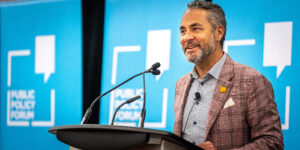
JP Gladu, Principal and Director, Mokwateh: “The excitement in this country is palpable, our communities are poised for incredible growth, but it’s not going to happen without partnerships, without capitalization.”
Thursday, 7:20 a.m.
Pedro Barata, Executive Director, Future Skills Centre kicks off our Indigenous breakfast: “The Indigenous population in Canada is young, growing, and frankly under-supported. Youth are having a collective coming of age – 350,000 Indigenous youth are entering the labour market by 2026, huge potential for the workforce.”
“The estimates are that if we do this right, Indigenous participation can boost the country’s economy by $27 billion annually…we all know there is tons of potential, we also know there are significant systemic barriers standing in the way…”
“For us at Future Skills Centre, in our own small part, we’re looking at how innovation and skills isn’t simply about building a better training program, or a course that works better, but how we build skill strategies that acknowledge historic wrongs, systemic barriers, racism. We need to really provide Indigenous communities with the economic power that they deserve.”
Wednesday, 6:22 p.m.
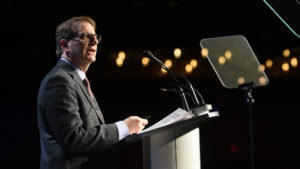
The Canada Growth Summit precedes the Testimonial Dinner — where more than 1,100 leaders and policy wonks from all sectors of society gather to pay tribute to distinguished Canadians who have made outstanding contributions to public policy and good governance.
And this year is a milestone event: It’s the 35th Annual Testimonial Dinner Honour Roll. For a peek at archive photos from PPF events, check out our Flickr reel.
This year, PPF will be recognizing the work of seven honourees:
- Naila Moloo is an inventor, researcher, innovator, communicator, change agent (and Grade 11 student in Ottawa). She’ll be recognized with the 2023 Emerging Leader Award.
- Stephanie Nolen is a global health reporter at New York Times. She’s this year’s Hyman Solomon Award Honouree
- John Risley is former CEO at Clearwater Seafoods Inc and a leader in reconciliation in Canadian business. He’ll be recognized with a 2023 Testimonial Dinner Award
- Janice Stein is the Founding Director of the Munk School of Global Affairs & Public Policy and one of Canada’s most important public intellectuals. She’s also a 2023 Testimonial Dinner Award Honouree.
- Harold Calla is the Executive Chair of the First Nations Financial Management Board. He’ll be awarded at the Testimonial Dinner.
- Hon. Lisa Raitt is Vice-Chair of Global Investment Banking at CIBC, and one of the top admired public officials in Canada. Her impact is being recognized with a Testimonial Dinner Award.
- Laurent Duvernay-Tardif is an NFL football player, a graduate of medicine and an exemplar of community spirit. He’ll receive a Testimonial Dinner Award.
Wednesday, 5:04 p.m.

‘Twas the night before the big event: And some attendees are making their way to one of seven Expert Table Dinners.
The dinners, held under the Chatham House Rule, have been held since 2018 and are intended to kickstart conversations ahead of Thursday’s public policy deep dive.
PPF began hosting these pre-summit dinners to offer a more intimate space for public policy-driven dialogue in advance of the following day’s Summit.
Here’s a sneak peek:
| 1. Breaking the Rules: A new, less predictable global trade order is emerging. How will Canada navigate? Hosted by: University of Toronto @ The Munk School
|
| 2. Measuring Canada’s Success: Rural, Urban, Economic and Social Progress
Hosted by: Coalition for a Better Future at Leña Restaurante
|
| 3. Industrial Transformation for the Common Good: How the Relationship between Business and Government Impacts Canadians Hosted by: Compass Rose @ Leña Restaurante
|
| 4. How does Canada position itself to lead the way on responsible AI and become a global leader? Hosted by: Microsoft @ CIBC Square
|
| 5. Indigenous Economic Growth Hosted by: CIBC
|
| 6. Digital Policy as Climate Policy
Hosted by:Telus @ Gusto 101
|
| 7. Mental Health of the Canadian Workforce
Hosted by: Deloitte
|
Wednesday, 2:54 p.m.
This year’s Canada Growth Summit — happening April 27 in Toronto — is completely sold out. It boasts a roster that’s jam-packed with government representatives and industry experts. Visit the events page for a full agenda and list of speakers for Canada Growth Summit.
This year’s Summit is hosted by CPAC anchor and reporter Michael Serapio.



